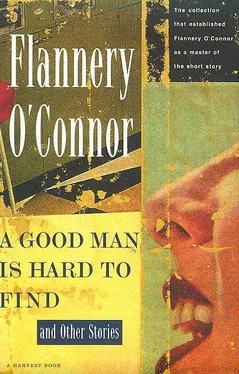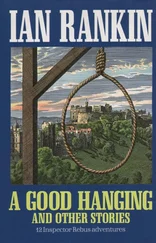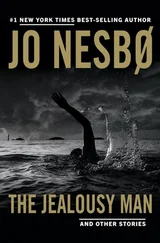Whenever she looked at Joy this way, she could not help but feel that it would have been better if the child had not taken the Ph.D. It had certainly not brought her out any and now that she had it, there was no more excuse for her to go to school again. Mrs. Hopewell thought it was nice for girls to go to school to have a good time but Joy had “gone through.” Anyhow, she would not have been strong enough to go again. The doctors had told Mrs. Hopewell that with the best of care, Joy might see forty-five. She had a weak heart. Joy had made it plain that if it had not been for this condition, she would be far from these red hills and good country people. She would be in a university lecturing to people who knew what she was talking about. And Mrs. Hopewell could very well picture her there, looking like a scarecrow and lecturing to more of the same. Here she went about all day in a six-year-old skirt and a yellow sweat shirt with a faded cowboy on a horse embossed on it. She thought this was funny; Mrs. Hopewell thought it was idiotic and showed simply that she was still a child. She was brilliant but she didn’t have a grain of sense. It seemed to Mrs. Hopewell that every year she grew less like other people and more like herself—bloated, rude, and squint-eyed. And she said such strange things! To her own mother she had said—without warning, without excuse, standing up in the middle of a meal with her face purple and her mouth halt full—“Woman! do you ever look inside? Do you ever look inside and see what you are not ? God!” she had cried sinking down again and staring at her plate, “Malebranche was right: we are not our own light. We are not our own light!” Mrs. Hopewell had no idea to this day what brought that on. She had only made the remark, hoping Joy would take it in, that a smile never hurt anyone.
The girl had taken the Ph.D. in philosophy and this left Mrs. Hopewell at a complete loss. You could say, “My daughter is a nurse,” or “My daughter is a school teacher,” or even, “My daughter is a chemical engineer.” You could not say, “My daughter is a philosopher.” That was something that had ended with the Greeks and Romans. All day Joy sat on her neck in a deep chair, reading. Sometimes she went for walks but she didn’t like dogs or cats or birds or flowers or nature or nice young men. She looked at nice young men as if she could smell their stupidity.
One day Mrs. Hopewell had picked up one of the books the girl had just put down and opening it at random, she read, “Science, on the other hand, has to assert its soberness and seriousness afresh and declare that it is concerned solely with what-is. Nothing—how can it be for science anything but a horror and a phantasm? If science is right, then one thing stands firm: science wishes to know nothing of nothing. Such is after all the strictly scientific approach to Nothing. We know it by wishing to know nothing of Nothing.” These words had been underlined with a blue pencil and they worked on Mrs. Hopewell like some evil incantation in gibberish. She shut the book quickly and went out of the room as if she were having a chill.
This morning when the girl came in, Mrs. Freeman was on Carramae. “She thrown up four times after supper,” she said, “and was up twict in the night after three o’clock. Yesterday she didn’t do nothing but ramble in the bureau drawer. All she did. Stand up there and see what she could run up on.”
“She’s got to eat,” Mrs. Hopewell muttered, sipping her coffee, while she watched Joy’s back at the stove. She was wondering what the child had said to the Bible salesman. She could not imagine what kind of a conversation she could possibly have had with him.
He was a tall gaunt hatless youth who had called yesterday to sell them a Bible. He had appeared at the door, carrying a large black suitcase that weighted him so heavily on one side that he had to brace himself against the door facing. He seemed on the point of collapse but he said in a cheerful voice, “Good morning, Mrs. Cedars!” and set the suitcase down on the mat. He was not a bad-looking young man though he had on a bright blue suit and yellow socks that were not pulled up far enough. He had prominent face bones and a streak of sticky-looking brown hair falling across his forehead.
“I’m Mrs. Hopewell,” she said.
“Oh!” he said, pretending to look puzzled but with his eyes sparkling, “I saw it said ‘The Cedars,’ on the mailbox so I thought you was Mrs. Cedars!” and he burst out in a pleasant laugh. He picked up the satchel and under cover of a pant, he fell forward into her hall. It was rather as if the suitcase had moved first, jerking him after it. “Mrs. Hopewell!” he said and grabbed her hand. “I hope you are well!” and he laughed again and then all at once his face sobered completely. He paused and gave her a straight earnest look and said, “Lady, I’ve come to speak of serious things.”
“Well, come in,” she muttered, none too pleased because her dinner was almost ready. He came into the parlor and sat down on the edge of a straight chair and put the suitcase between his feet and glanced around the room as if he were sizing her up by it. Her silver gleamed on the two sideboards; she decided he had never been in a room as elegant as this.
“Mrs. Hopewell,” he began, using her name in a way that sounded almost intimate, “I know you believe in Chrustian service.”
“Well yes,” she murmured.
“I know,” he said and paused, looking very wise with his head cocked on one side, “that you’re a good woman. Friends have told me.”
Mrs. Hopewell never liked to be taken for a fool. “What are you selling?” she asked.
“Bibles,” the young man said and his eye raced around the room before he added, “I see you have no family Bible in your parlor, I see that is the one lack you got!”
Mrs. Hopewell could not say, “My daughter is an atheist and won’t let me keep the Bible in the parlor.” She said, stiffening slightly, “I keep my Bible by my bedside.” This was not the truth. It was in the attic somewhere.
“Lady,” he said, “the word of God ought to be in the parlor.”
“Well, I think that’s a matter of taste,” she began. “I think…”
“Lady,” he said, “for a Chrustian, the word of God ought to be in every room in the house besides in his heart. I know you’re a Chrustian because I can see it in every line of your face.”
She stood up and said, “Well, young man, I don’t want to buy a Bible and I smell my dinner burning.”
He didn’t get up. He began to twist his hands and looking down at them, he said softly, “Well lady, I’ll tell you the truth—not many people want to buy one nowadays and besides, I know I’m real simple. I don’t know how to say a thing but to say it. I’m just a country boy.” He glanced up into her unfriendly face. “People like you don’t like to fool with country people like me!”
“Why!” she cried, “good country people are the salt of the earth! Besides, we all have different ways of doing, it takes all kinds to make the world go ‘round. That’s life!”
“You said a mouthful,” he said.
“Why, I think there aren’t enough good country people in the world!” she said, stirred. “I think that’s what’s wrong with it!”
His face had brightened. “I didn’t inraduce myself,” he said. “I’m Manley Pointer from out in the country around Willohobie, not even from a place, just from near a place.”
“You wait a minute,” she said. “I have to see about my dinner.” She went out to the kitchen and found Joy standing near the door where she had been listening.
“Get rid of the salt of the earth,” she said, “and let’s eat.”
Mrs. Hopewell gave her a pained look and turned the heat down under the vegetables. “ I can’t be rude to anybody,” she murmured and went back into the parlor.
Читать дальше









